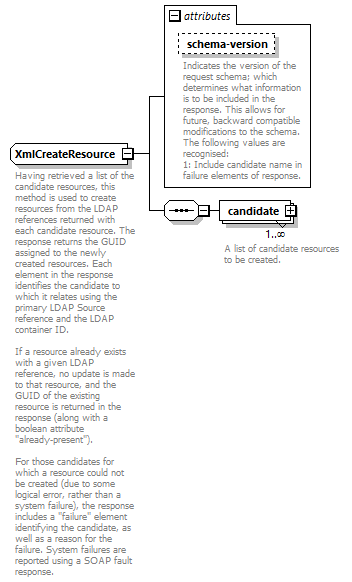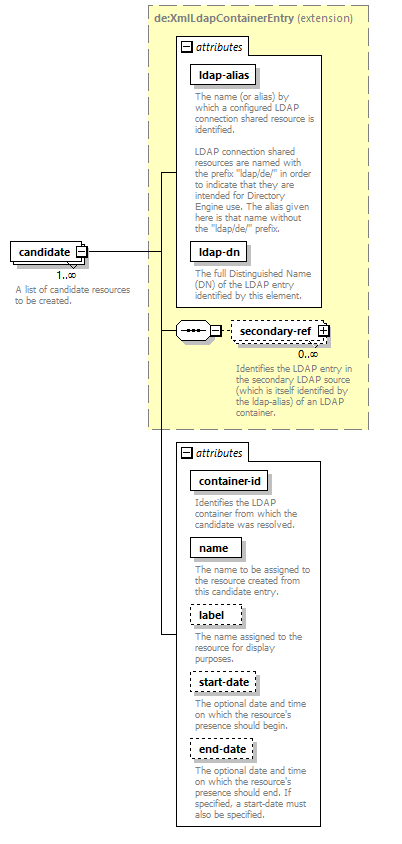| diagram |  |
||||||||||||||
| namespace | http://resource.api.de.bpm.tibco.com | ||||||||||||||
| children | candidate | ||||||||||||||
| attributes |
|
||||||||||||||
| annotation |
|
||||||||||||||
| source | <xs:complexType name="XmlCreateResource"> <xs:annotation> <xs:documentation>Having retrieved a list of the candidate resources, this method is used to create resources from the LDAP references returned with each candidate resource. The response returns the GUID assigned to the newly created resources. Each element in the response identifies the candidate to which it relates using the primary LDAP Source reference and the LDAP container ID. If a resource already exists with a given LDAP reference, no update is made to that resource, and the GUID of the existing resource is returned in the response (along with a boolean attribute "already-present"). For those candidates for which a resource could not be created (due to some logical error, rather than a system failure), the response includes a "failure" element identifying the candidate, as well as a reason for the failure. System failures are reported using a SOAP fault response.</xs:documentation> </xs:annotation> <xs:sequence> <xs:element name="candidate" minOccurs="1" maxOccurs="unbounded"> <xs:annotation> <xs:documentation>A list of candidate resources to be created.</xs:documentation> </xs:annotation> <xs:complexType> <xs:complexContent> <xs:extension base="de:XmlLdapContainerEntry"> <xs:attribute name="container-id" type="xs:long" use="required"> <xs:annotation> <xs:documentation>Identifies the LDAP container from which the candidate was resolved.</xs:documentation> </xs:annotation> </xs:attribute> <xs:attribute name="name" type="xs:string" use="required"> <xs:annotation> <xs:documentation>The name to be assigned to the resource created from this candidate entry.</xs:documentation> </xs:annotation> </xs:attribute> <xs:attribute name="label" type="xs:string"> <xs:annotation> <xs:documentation>The name assigned to the resource for display purposes.</xs:documentation> </xs:annotation> </xs:attribute> <xs:attribute name="start-date" type="xs:dateTime" use="optional"> <xs:annotation> <xs:documentation>The optional date and time on which the resource's presence should begin.</xs:documentation> </xs:annotation> </xs:attribute> <xs:attribute name="end-date" type="xs:dateTime" use="optional"> <xs:annotation> <xs:documentation>The optional date and time on which the resource's presence should end. If specified, a start-date must also be specified.</xs:documentation> </xs:annotation> </xs:attribute> </xs:extension> </xs:complexContent> </xs:complexType> </xs:element> </xs:sequence> <xs:attribute name="schema-version" type="xs:int" use="optional" default="1"> <xs:annotation> <xs:documentation>Indicates the version of the request schema; which determines what information is to be included in the response. This allows for future, backward compatible modifications to the schema. The following values are recognised: 1: Include candidate name in failure elements of response.</xs:documentation> </xs:annotation> </xs:attribute> </xs:complexType> |
attribute XmlCreateResource/@schema-version
| type | xs:int | ||||
| properties |
|
||||
| annotation |
|
||||
| source | <xs:attribute name="schema-version" type="xs:int" use="optional" default="1"> <xs:annotation> <xs:documentation>Indicates the version of the request schema; which determines what information is to be included in the response. This allows for future, backward compatible modifications to the schema. The following values are recognised: 1: Include candidate name in failure elements of response.</xs:documentation> </xs:annotation> </xs:attribute> |
element XmlCreateResource/candidate
| diagram |  |
||||||||||||||||||||||||||||||||||||||||||||||||||||||||||||||
| type | extension of XmlLdapContainerEntry | ||||||||||||||||||||||||||||||||||||||||||||||||||||||||||||||
| properties |
|
||||||||||||||||||||||||||||||||||||||||||||||||||||||||||||||
| children | secondary-ref | ||||||||||||||||||||||||||||||||||||||||||||||||||||||||||||||
| attributes |
|
||||||||||||||||||||||||||||||||||||||||||||||||||||||||||||||
| annotation |
|
||||||||||||||||||||||||||||||||||||||||||||||||||||||||||||||
| source | <xs:element name="candidate" minOccurs="1" maxOccurs="unbounded"> <xs:annotation> <xs:documentation>A list of candidate resources to be created.</xs:documentation> </xs:annotation> <xs:complexType> <xs:complexContent> <xs:extension base="de:XmlLdapContainerEntry"> <xs:attribute name="container-id" type="xs:long" use="required"> <xs:annotation> <xs:documentation>Identifies the LDAP container from which the candidate was resolved.</xs:documentation> </xs:annotation> </xs:attribute> <xs:attribute name="name" type="xs:string" use="required"> <xs:annotation> <xs:documentation>The name to be assigned to the resource created from this candidate entry.</xs:documentation> </xs:annotation> </xs:attribute> <xs:attribute name="label" type="xs:string"> <xs:annotation> <xs:documentation>The name assigned to the resource for display purposes.</xs:documentation> </xs:annotation> </xs:attribute> <xs:attribute name="start-date" type="xs:dateTime" use="optional"> <xs:annotation> <xs:documentation>The optional date and time on which the resource's presence should begin.</xs:documentation> </xs:annotation> </xs:attribute> <xs:attribute name="end-date" type="xs:dateTime" use="optional"> <xs:annotation> <xs:documentation>The optional date and time on which the resource's presence should end. If specified, a start-date must also be specified.</xs:documentation> </xs:annotation> </xs:attribute> </xs:extension> </xs:complexContent> </xs:complexType> </xs:element> |
attribute XmlCreateResource/candidate/@container-id
| type | xs:long | ||
| properties |
|
||
| annotation |
|
||
| source | <xs:attribute name="container-id" type="xs:long" use="required"> <xs:annotation> <xs:documentation>Identifies the LDAP container from which the candidate was resolved.</xs:documentation> </xs:annotation> </xs:attribute> |
attribute XmlCreateResource/candidate/@name
| type | xs:string | ||
| properties |
|
||
| annotation |
|
||
| source | <xs:attribute name="name" type="xs:string" use="required"> <xs:annotation> <xs:documentation>The name to be assigned to the resource created from this candidate entry.</xs:documentation> </xs:annotation> </xs:attribute> |
attribute XmlCreateResource/candidate/@label
| type | xs:string | ||
| annotation |
|
||
| source | <xs:attribute name="label" type="xs:string"> <xs:annotation> <xs:documentation>The name assigned to the resource for display purposes.</xs:documentation> </xs:annotation> </xs:attribute> |
attribute XmlCreateResource/candidate/@start-date
| type | xs:dateTime | ||
| properties |
|
||
| annotation |
|
||
| source | <xs:attribute name="start-date" type="xs:dateTime" use="optional"> <xs:annotation> <xs:documentation>The optional date and time on which the resource's presence should begin.</xs:documentation> </xs:annotation> </xs:attribute> |
attribute XmlCreateResource/candidate/@end-date
| type | xs:dateTime | ||
| properties |
|
||
| annotation |
|
||
| source | <xs:attribute name="end-date" type="xs:dateTime" use="optional"> <xs:annotation> <xs:documentation>The optional date and time on which the resource's presence should end. If specified, a start-date must also be specified.</xs:documentation> </xs:annotation> </xs:attribute> |
WSDL documentation generated by XMLSpy WSDL Editor http://www.altova.com/xmlspy